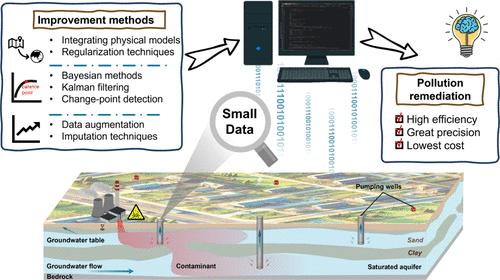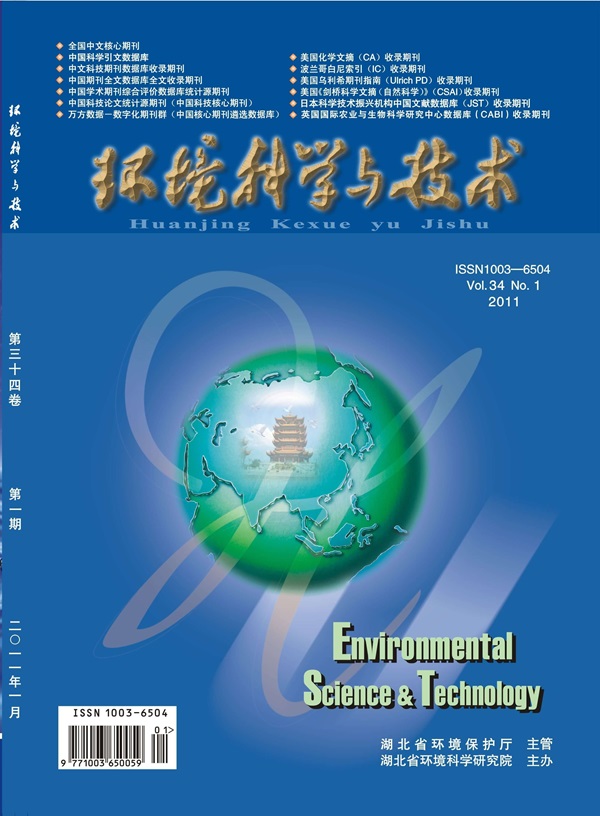地下水管理的小数据洞察
IF 11.3
1区 环境科学与生态学
Q1 ENGINEERING, ENVIRONMENTAL
引用次数: 0
摘要
图1所示。地下水系统内的小数据生成、增强方法和数据分析对于改善污染场地的修复效果至关重要。由于采样成本高和物流困难,从钻孔收集的有限监测数据可以用于地下水污染现场的深入分析。最大化小数据效用的优化方法不仅增强了对后续修复工作的评估,而且还支持开发高效、高精度和具有成本效益的修复策略。z.z和yw领导构思、写作和绘图。y.c.、y.c.和J.Z.协助写作和绘图。H.L.和Y.W.构思构思并设计框架。t.c.j.y.和Y.L.帮助提高了论文的写作水平。所有作者都批准了最终的出版形式。魏亚强博士现任上海大学副教授。于上海交通大学完成博士后研究,2017年获中国科学院大学博士学位,与美国亚利桑那大学联合培养。他的主要研究方向是土壤和地下水中污染物的迁移、转化和命运。主持多项研究项目,包括国家自然科学基金重点基金和青年基金项目1项,国家土壤污染成因与控制技术重点研发计划子项目2项。他还担任《生态环境》等期刊的年轻编辑委员会成员;卫生和农业通讯。国家自然科学基金项目(42477004,42330706,42125706)资助。本文引用了46个其他出版物。这篇文章尚未被其他出版物引用。本文章由计算机程序翻译,如有差异,请以英文原文为准。

Small Data Insights for Groundwater Management
Figure 1. Small data generation, enhancement methods, and data analysis within groundwater systems are essential for improving remediation outcomes at contaminated sites. Constrained by high sampling costs and logistical challenges, limited monitoring data collected from boreholes can be leveraged for in-depth analysis at a site with contaminated groundwater. Optimized methods for maximizing the utility of small data not only enhance the evaluation of subsequent remediation efforts but also support the development of efficient, high-precision, and cost-effective remediation strategies. Z.Z. and Y.W. led the conceptualization, writing, and figure drafting. Y.C., Y.C., and J.Z. assisted with writing and figures. H.L. and Y.W. conceived the ideas and designed the framework. T.-C.J.Y. and Y.L. helped to improve the writing of the paper. All authors approved the final form for publication. Dr. Yaqiang Wei is currently an Associate Professor at Shanghai University. He completed his postdoctoral research at Shanghai Jiao Tong University and obtained his Ph.D. from the University of Chinese Academy of Sciences in 2017, with a joint training program at the University of Arizona, United States. His primary research focus is on the migration, transformation, and fate of contaminants in soil and groundwater. He has led several research projects, including a project of key fund and a Youth Fund from the National Natural Science Foundation, and two subprojects under the National Key Research and Development Program for Soil Pollution Causes and Control Technologies. He also serves as a young editorial board member for journals such as Eco-Environment & Health and Agriculture Communications. This work was supported by the National Natural Science Foundation of China (42477004, 42330706, and 42125706). This article references 46 other publications. This article has not yet been cited by other publications.
求助全文
通过发布文献求助,成功后即可免费获取论文全文。
去求助
来源期刊

环境科学与技术
环境科学-工程:环境
CiteScore
17.50
自引率
9.60%
发文量
12359
审稿时长
2.8 months
期刊介绍:
Environmental Science & Technology (ES&T) is a co-sponsored academic and technical magazine by the Hubei Provincial Environmental Protection Bureau and the Hubei Provincial Academy of Environmental Sciences.
Environmental Science & Technology (ES&T) holds the status of Chinese core journals, scientific papers source journals of China, Chinese Science Citation Database source journals, and Chinese Academic Journal Comprehensive Evaluation Database source journals. This publication focuses on the academic field of environmental protection, featuring articles related to environmental protection and technical advancements.
 求助内容:
求助内容: 应助结果提醒方式:
应助结果提醒方式:


